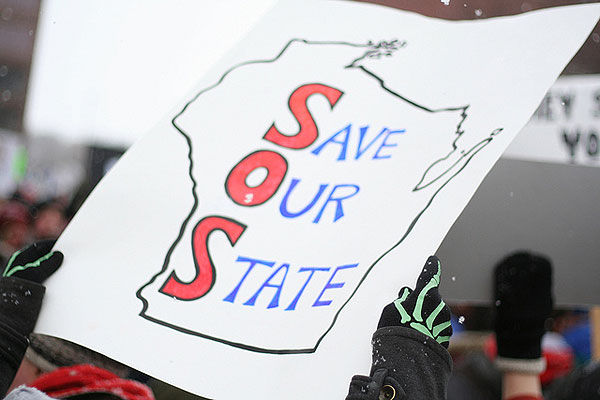
Scott Walker isn’t the only Republican governor doing battle with public-sector unions, but unlike New Jersey’s Chris Christie, Walker’s popularity is plummeting, as the protests against him have dominated the news for weeks. He’s made a lot of errors, but he’s also been the victim of misinformation.
1. Having a state capitol in the same city as the University of Wisconsin
Consider the fact that the protests have been going on almost continuously for three weeks. I don’t think it takes away from the dedication of the protesters to note that a historically left-leaning city that houses both the state capitol and the largest public educational institution in the state is an inconvenient place to try to break public unions. A lot of people in Madison have reason to sympathize with public employees, especially educators.
It’s not a bed Walker made, but he does have to lie in it.
2. Public sector unions are more popular than private sector unions
It’s true. I can think of a lot of reasons for this. The main reason, I submit, is that people have more interaction with the work product of public-sector union members, and the union members themselves. If you buy a car, the components may or may not be the product of union members, and you can only know if you research. If you go to public school, or send your kids to one, or call the cops, or your house burns down, or use public transit, you’re dealing with a union member. Not a day goes by that I don’t, which isn’t the case with private-sector union members. Their presence is much more immediate.
Another reason, I think, has to do with political history and its interaction with popular culture. Unions have always been a flashpoint in American culture (particularly in the home of the Haymarket Riot and the Pullman Strike), but the 1950s were a turning point with the McClellan Commission (which lasted three years and was followed by Robert Kennedy’s book The Enemy Within) and On the Waterfront.
Put simply, it’s not the NEA that beats up Marlon Brando.
3. Teachers are really, really popular
Also true. By the time we reach adulthood, most of us have spent almost as much time with teachers as our parents. Of all the union members Americans interact with or rely on, we’re most likely to have spent time on the job with, and the ones parents are most likely to entrust their kids to. Teachers aren’t the only union members Gov. Walker is battling, but they’ve been at the center of attention, in part because teachers’ union members got the Wisconsin protests off the ground.
4. His divide-and-conquer busting of the unions failed
Notably, Gov. Walker didn’t take on public safety unions. That backfired on him, as firefighters and cops have been protesting in solidarity.
5. He overreached with collective-bargaining limitations
Gov. Walker refused to negotiate with unions that were conceding; alternately, Chris Christie, the Republican governor of New Jersey, is trying to negotiate with a teachers’ union that won’t. If anything, Christie’s rhetoric is stronger, but he’s politically in a much stronger position, and is considerably more popular right now than Walker.
The latest word from Wisconsin is that removing the collective-bargaining provisions from the budget repair bill may be the crux of a compromise. If that happens, Walker would essentially be back at square one, having spent three weeks doing significant damage to his popularity.
(Speaking of Christie, he has his nose out of joint because For a Better Chicago is running ads in New Jersey papers about how his state’s taxes are too high.)
6. In which I defend Gov. Walker, sort of
One of the headlines I saw all over Facebook and Twitter and whatnot was "Wisconsin Gov. Walker Ginned Up Budget Shortfall To Undercut Worker Rights." As of now that post has been shared 34,000 times on Facebook.
But it’s not accurate. The claimed budget surplus goes away if you include money that the state owes. There’s some flexibility about paying those debts, but they’re still debts.
It’s further claimed that the budget shortfall is due to new spending enacted by Walker. Politifact found that it’s not spending–it’s tax cuts–and it doesn’t impact the fiscal-year shortfall. Of course, Walker has made his own misstatements. It’s really a mess.
Photo: gregtarnoff (CC by 2.0)


